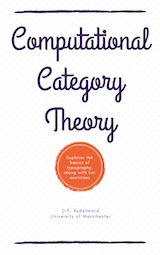
|
FreeComputerBooks.com
Links to Free Computer, Mathematics, Technical Books all over the World
|
|
- Title: Computational Category Theory
- Author(s) David E. Rydeheard, R.M. Burstall
- Publisher: The University of Manchester
- Permission: The manual is available for personal use only and not to be distributed, made multiple copies, made available on other websites, or sold in any format.
- Hardcover/Paperback: N/A
- eBook: PDF and PostScript
- Language: English
- ISBN-10: N/A
- ISBN-13: N/A
- Share This:

|
This book is an implementation of concepts and constructions from category theory in the functional programming language Standard ML. It it proceeds from algorithm to algorithm until all of elementary category theory is laid out in precise computational form.
About the Authors- N/A
- Category Theory
- Functional Programming and Lambda
- Theory of Programming Languages
- Functional Programming
- Compiler Construction

- Computational Category Theory (David E. Rydeheard,, et al.)
- The Mirror Site (1) - PDF
- Book Homepage (PDF, PostScript, Source Code, etc.)
- Basic Category Theory For Computer Scientists (Benjamin C. Pierce)
-
 Category Theory for Computing Science (Michael Barr, et al.)
Category Theory for Computing Science (Michael Barr, et al.)
This book is a textbook in basic category theory, written specifically to be read by people in computing science. It expounds the constructions we feel are basic to category theory in the context of examples and applications to computing science.
-
 Category Theory: A Programming Language Oriented Introduction
Category Theory: A Programming Language Oriented Introduction
This book explains the following topics: Categories, functors, natural transformations, String diagrams, Kan extensions, Algebras, coalgebras, bialgebras, Lambda-calculus and categories.
-
 Category Theory for Programmers (Bartosz Milewski)
Category Theory for Programmers (Bartosz Milewski)
In this category theory for programmers, the author illustrates all major concepts using computer code. You are probably aware that functional languages are closer to math than the more popular imperative languages. They also offer more abstracting power.
-
 Category Theory for the Sciences (David I. Spivak)
Category Theory for the Sciences (David I. Spivak)
Using databases as an entry to Category Theory, this book explains category theory by examples, and shows that category theory can be useful outside of mathematics as a rigorous, flexible, and coherent modeling language throughout the sciences.
-
 An Invitation to Applied Category Theory: Seven Sketches
An Invitation to Applied Category Theory: Seven Sketches
Category theory is now a powerful tool in science, informatics, and industry. This book offers a self-contained tour of applied category theory. Each chapter follows a single thread motivated by a real-world application and discussed with category-theoretic tools.
-
 Topology: A Categorical Approach (Tai-Danae Bradley, et al)
Topology: A Categorical Approach (Tai-Danae Bradley, et al)
A graduate-level textbook that presents basic topology from the perspective of category theory. Many graduate students are familiar with the ideas of point-set topology and they are ready to learn something new about them.
-
 Basic Category Theory (Tom Leinster)
Basic Category Theory (Tom Leinster)
Assuming little mathematical background, this short introduction to Category Theory is ideal for beginning graduate students or advanced undergraduates learning category theory for the first time.
-
 Category Theory in Context (Emily Riehl)
Category Theory in Context (Emily Riehl)
This book introduces the essential concepts of category theory: categories, functors, natural transformations, the Yoneda lemma, limits and colimits, adjunctions, monads, Kan extensions, and other topics.
-
 Categories, Types, and Structures (Andrea Asperti, et al)
Categories, Types, and Structures (Andrea Asperti, et al)
This book introduces Category Theory at a level appropriate for computer scientists and provides practical examples in the context of programming language design. It pursues the more complex mathematical semantics of data types and programs.
-
 Categorical Homotopy Theory (Emily Riehl)
Categorical Homotopy Theory (Emily Riehl)
This book develops abstract homotopy theory from the categorical perspective with a particular focus on examples. It helps consolidate and simplify one's understanding of derived functors, homotopy limits and colimits, and model categories, among others.
-
 Higher Topos Theory (Jacob Lurie)
Higher Topos Theory (Jacob Lurie)
This book presents the foundations of Higher Topos Theory, using the language of weak Kan complexes, and shows how existing theorems in algebraic topology can be reformulated and generalized in the theory's new language.
-
 Programming in Martin-Lof's Type Theory: An Introduction
Programming in Martin-Lof's Type Theory: An Introduction
This book focuses on the type theory developed by Per Martin-Lof. It contains a thorough introduction to the Martin-Lof's Type Theory, with information on polymorphic sets, subsets, monomorphic sets, and a full set of helpful examples.





